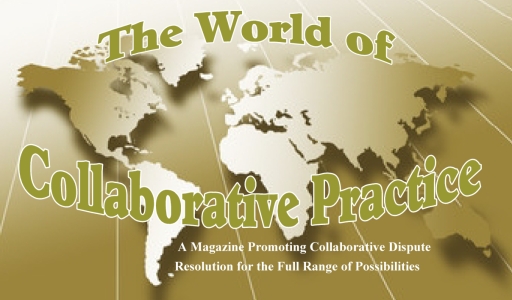
Tags
Related Posts
Share This
Are There Disadvantages to the Collaborative Process?
We at The World of Collaborative Practice are unabashed supporters of CP. That does not mean we pretend that people don’t see disadvantages in that approach. Or that we believe there never are any. Here’s a conversation that took place among several Collaborative Practice professionals about potential ‘disadvantages’ of the process.
**************
I am preparing for a media interview on Collaborative Divorce. One of the questions I anticipate being asked is what are the drawbacks to the process. In coming up with possible responses, I realized that this is an area that needs to be explored in detail in obtaining informed consent from a prospective Collaborative client.
Aside from the consequences from the disqualification requirements if the process terminates, what do you folks see as the biggest disadvantages? Thanks in advance for your thoughts.
Thomas P. Walk, Esq.
foggielaw@awwlaw.com
Altizer, Walk and White PLLC
209 E. Main St.
Tazewell, VA 24651
276-988-7979
Tue, Nov 8, 2011 at 8:06 AM
*******************
I would rephrase “disadvantage” to “challenge” and say that the coordination between team members is a challenge.
Michal Kaempfer
Michal Kaempfer, Adv.
Collaborative Practice, Mediation
1 Tchernihowsky street, Raanana, Israel
Tel: +972-97728338, Mobile: +972-528382466
www.divorce-together.com
Michal@divorce-together.com
Tue, Nov 8, 2011 at 8:33 AM
*******************
Disadvantages of CP? Apart from the one you mentioned, which I actually see as an advantage, I can’t see any, providing that the couple have been properly screened and assessed for the process.
Stephen G Anderson
family mediator and collaborative lawyer
Birketts LLP Family Law website
stephen-anderson@birketts.co.uk
Tue, Nov 8, 2011 at 8:46 AM
*******************
I gathered together several ‘disadvantages’ I’ve heard and read over the years into an article I wrote on the Ethical Issues. (not that I agree with all of them) http://normatrusch.com/
Norma L. Trusch
nltrusch@sbcglobal.net
Houston, TX
http://www.normatrusch.com
Tue, Nov 8, 2011 at 9:06 AM
*******************
Seriously! No disadvantages? How about the risks inherent in revealing things that a spouse had wanted to keep secret, such as an affair not yet known to the other. If that is revealed for the first time in CP and the other spouse is shocked or feels “armed” by that news, he/she could withdraw and then proceed with litigation using that grounds, for what it may be worth in the jurisdiction. Someone earlier mentioned informed consent, and this would cover that, but a client might not think it “matters,” and then face a potentially difficult consequence….
PS – I’m a major advocate of CP, but don’t believe it’s the ONLY way to go for some clients….
— — —
Douglas J. Sanderson
McCandlish & Lillard, P.C.
11350 Random Hills Road, Suite 500
Fairfax, Virginia 22030-7429
Telephone: (703) 934-1122
email: dsand@mccandlaw.com
www.mccandlaw.com
Tue, Nov 8, 2011 at 9:12 AM
*******************
Douglas, surely that should be apparent from the screening if carried out thoroughly. I’m not saying that collaborative cases will never fail, only that I don’t see any disadvantages that don’t exist in the other processes. BTW, In England & Wales, generally speaking, the fact of adultery will not affect the financial outcome.
Stephen G Anderson
stephen-anderson@birketts.co.uk
Tue, Nov 8, 2011 at 9:21 AM
*******************
1. In litigation, you can use the timing and immense stress and fear of impending trials to get people to sign settlements they never would agree to if they actually had time to consider them.
2. In litigation, often if you have deeper pockets or more outside support, you can get everything you want by making the enemy deplete his war chest very early in the process, beginning with pendente lite hearings, depositions, discovery requests, discovery disputes and enforcement, pendente lite order enforcement, etc., until he’s completely out of money and has to unconditionally surrender.
It’s a lot harder to do that in collaborative because (a) it doesn’t cost anywhere near as much as litigation, and (b) when resources are unequal there’s usually an agreement on how to pay both clients’ costs.
Neither of those bothers me, but you could call them drawbacks of the collaborative process.
3. Conversely, one thing that DOES bother me about collaborative, is, what if one spouse uses up their entire war chest in a collaboration that fails, while the other spouse doesn’t? True, that is just as much of a problem, or more, in litigation or conventional negotiation, but it still can be a challenge and you need to be thinking about how to prevent it in collaboration. I’ve spoken to one ex-collaborator who felt that that’s what happened in his case.
John Crouch
Crouch & Crouch, PLC
International and Collaborative Family Law
2111 Wilson Blvd., Suite 950
Arlington, Virginia 22201
703-528-6700
john@crouchfamilylaw.com
www.divorceandestateplanning.com
Tue, Nov 8, 2011 at 10:18 AM
*******************
I agree that in the interview it may be helpful to reframe the question if it is asked and address the question as “what are some of the challenges inherent in the collaborative process” – be transparent & let the interviewer know that you are reframing, and why. I think we wind up doing a disservice to our work when we speak about these “challenges” as disadvantages. Each aspect that can be seen as a challenge can also lend itself to a strength of the process.
Cheers – amy
Amy H. Martell, mediator and collaborative attorney
1 Snow Road, Marshfield, MA 02050
T: 781-780-2500
E: info@wholefamilylaw.com www.wholefamilylaw.com
Tue, Nov 8, 2011 at 11:05 AM
*******************
Honestly, I had to struggle with this question because the disqualification clause is the big one that jumps to mind. But, I think another disadvantage is when the clients are not physically in the same geographical area and they really need to be physically present at the table for a collaboration. I’ve had a case where a client was on travel and wanted to go ahead with a meeting but via phone so the 2 attorneys and other client were in the room with the other client on speaker phone. But I wouldn’t want to make a habit of that.
Regards,
Darcy Shoop
Darcy A. Shoop, LLC
110 North Washington Street, Suite 300
Rockville, Maryland 20850
(301) 340-7950
dshoop@darcyshoop.com
www.darcyshoop.com
Tue, Nov 8, 2011 at 11:44 AM
*******************
Screening interviews are key to discovering the nature and intent of the parties. However, one meeting cannot always give the lawyer all of the information necessary to detect who should and should not be in the process. Some folks just need to go to the courthouse. Allowing one party to use up the resources of the other is an abuse of the process, and collaborative lawyers should constantly be on guard against this. If one party is not cooperating, knowing that the other party’s financial resources are limited, the slacker’s lawyer should step in. If the lawyer does nothing, the other party should consider terminating the process to avoid unnecessary expenses. (I still believe if someone is not able to afford the collaborative process, that person certainly will not be able to afford litigation.)
Another option is to limit the number of allied professionals in the case. I know that they can be helpful, but it would be more helpful to get the divorce over and finalized. The lawyers will have to work harder, but that may be what it takes.
Perhaps a limit should be placed on the number of hours that are going to be spent on CL. After so many hours, evaluate where the client is and how the case is progressing. Let the client decide if he or she feels the process should continue or not. Yet another option would be to have a set number of meetings, and if the parties have not settled, use Med/Arb to finally resolve the matter. If they go to litigation it will be a lot more expensive and a third party will be handing down the decision anyhow.
I am sure that many of you can ! think of more options than these. However, I go back to the first interview. When clients are screened, they need to understand exactly what they are getting into. If you truly give them enough information to get their informed consent for the process, they should have no complaints. As Clint Eastwood says, “If you want a guarantee, buy a toaster.” I tell clients that, and they seem to understand that there are no guarantees.
Sherrie R. Abney
Law Offices of Sherrie R. Abney
2840 Keller Springs Road, Ste. 204
Carrollton, Texas 75006
972-417-7198
sherrie.abney@att.net
Tue, Nov 8, 2011 at 12:22 PM
*******************
Isn’t calling the disqualification agreement a disadvantage of the process sort of like saying the commitment, the vow, is the disadvantage of marriage?
Beth Karassik
Sent from Yahoo! Mail on Android
Sent: Tuesday, November 08, 2011 1:31 PM
*******************
I think that the more appropriate analogy would be comparing the disqualification clause to the marriage license. Both have legal implications whereas the vow and commitment are nothing but boilerplate.
I am pleased that many attorneys listed items which they think, recognize or have been made aware of, as disadvantages or challenges.
Morris Armstrong
divorce.afs@gmail.com
Armstrong Financial Strategies
57 North St Suite 105
Danbury CT 06810
203 744 9297
www.armstrong-financial.com
Read My Articles from Yahoo!finance and Yahoo!News My Profile
author of : http://financial-planning-for-you.blogspot.com
Tue, Nov 8, 2011 at 12:46 PM
*******************
We live in a black and white sound bite world. So much of our work is shaded gray and subtlety takes longer to convey. Every client has process choices and there are consequences to every choice. One person may view a process feature as a disadvantage and another person may think of it as an advantage. Clients have told me that they fear going to court and CP appeals to them because of the disqualification feature. We have all heard the other side of that idea as well. Qualitative analysis…better than…quicker…cheaper…isn’t very useful…when evaluating different processes. Collaboration is different than litigation and each choice has different consequences.
David Murch
dmurch1@rochester.rr.com
Tue, Nov 8, 2011 at 5:32 PM
Sent from my Verizon Wireless BlackBerry
*******************
Oh this is just brilliant and will be repeated! I tell clients considering CP that the DQ is the power behind this process. Thanks for a great analogy to assist in explaining why.
Deborah Berecz
dlb@familyresolutions.us
Wed, Nov 9, 2011 at 5:21 AM
Sent from my iPhone hence the brevity.
Collaborative Lawyer | Mediator
Grand Rapids, Michigan
*******************
My experience is that it requires a GENUINE commitment on the part of both parties to find a solution. Occasionally, one party or the other will see Collab as a process which shields them from the reality of moving forward.. we take the court out of the process, so that threat is removed, and that then allows them to continue in a never-ending discussion of options and concerns without actually moving forward. Hence the importance of good coaches to identify these issues – but often, I have noticed the lawyer/lawyer process breaking down over lack of progress – generally resulting in my opinion, from one party not actually wanting to move forward into the scary world of “post-marriage”.
Rob Harvie
rgh@huckvale.ca
Wed, Nov 9, 2011 at 10:03 AM
*******************
Nearly a thousand professionals from around the world engage in active discussion about their work in Collaborative Practice. From time to time, as particular discussions take place, The World of Collaborative Practice will publish those discussions. The comments and opinions are only those of the named participants and are published here with their express permission. While links to this discussion are always welcome, republication of the discussion requires express permission of TWoCP and the writers. No individual comment may be quoted without the entire conversation without express permission of the individual writer(s). Interested professionals may join ‘the listServe’ by following the steps outlined here. [It’s free!]









Share your thoughts here and in your network.